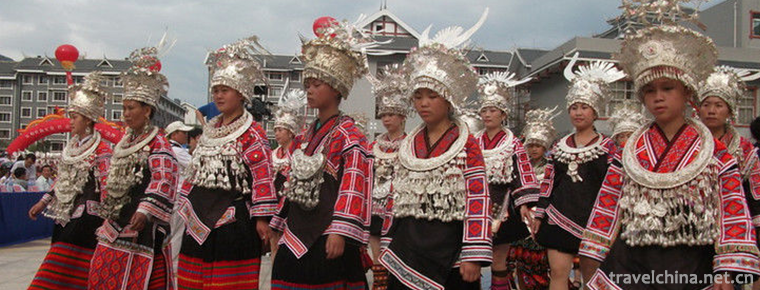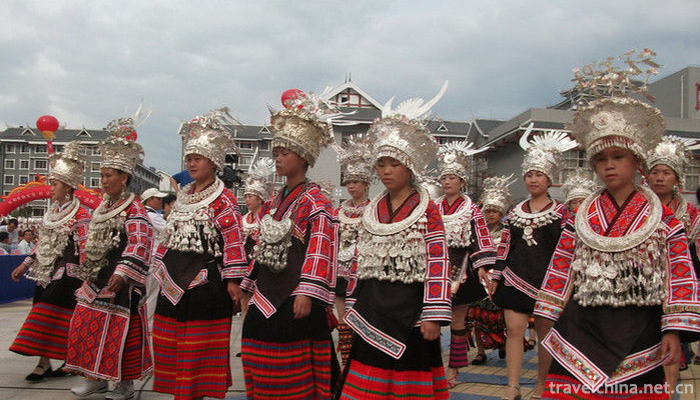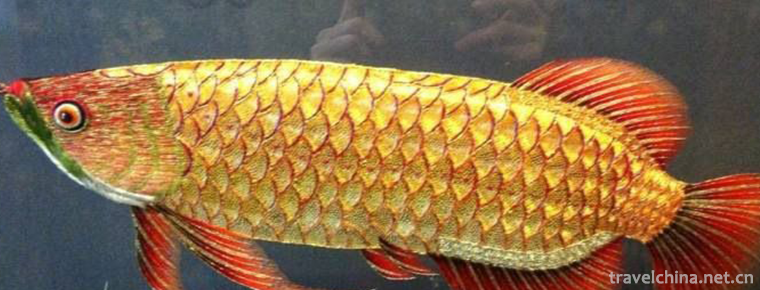2019-07-16

- By ChinaWiki.net
- Chinese Edition
- 2019-07-11
Yangasha
Yangasha, an epic originating in Jianhe, Guizhou Province, is eulogized for Miao compatriots from generation to generation. It is a sad and elegant love story about a passionate Miao girl. It is the Guizhou version of "Liu Sanjie" and the Miao version of "Ashima".
On June 7, 2008, the "Yangasha" declared by the Miao and Dong Autonomous Prefecture in southeastern Guizhou Province was listed in the second batch of national intangible cultural heritage list with the approval of the State Council. In April 2017, the statue of Miao beauty God "Yangasha" situated on the Bank of Yangasha Lake in Jianhe County has completed 90% of the project construction. It is expected that the main project will be completed by the end of this month, and it will become the highest statue of Miao beauty God in the country after completion.
Legend of Beauty God
In ancient times, in the middle of a valley, there was a deep pool of green and secluded, with green trees and beautiful flowers on both sides of the mountain. The spring water in the well is quiet and quiet. The clouds and birds in the sky can be seen, and the trees and flowers near the well can be seen. One day, a flock of herons came from the East and a flock of ducks from the west. When they saw this beautiful well, they wanted to look for fish and shrimp in it. The God who guarded the well jumped up and shouted angrily.
"Bah! What are you doing here? This is not a fish pond. This is where Yan Asha was born. Tomorrow she will be born, you don't peck! Anyone who dares to touch a hair of her will tell her not to return home! "Herons and ducks had to fly away with their tails.
The next day, suddenly the sky was dark, the light flashed, the thunder rumbled, and the rain poured down. The well was bubbling, making a "wave-wave-wave" sound. Shortly afterwards, the rain stopped and the sky cleared up. Colorful clouds, like exotic flowers embroidered by Miao girls, floated in the clear sky. At this time, Yangasha came out of the well, butterflies were flying around her in groups, and countless birds were singing around her... Everyone is happy to celebrate the birth of beautiful Asa.
The first day Asa was born, she would laugh, the next day she would talk, the third day she would sing, and the fourth day she would weave and embroider. Yangasha's song is so euphemistic and pleasant that it flies all over the mountains and mountains and resounds through villages and villages. In cloudy days, her singing can drive clouds away and fog out, and the sun out; in winter, her singing can drive the cold away and make mountains full of flowers. Bees hear her singing and forget to gather honey; birds hear her singing and forget to sing; young men hear her singing and forget to live in their hands; girls hear her singing and learn to sing word by word.
Day by day, year by year. Yingshan Red has opened and thanked, thanked and opened again, Yingshan Red has opened 18 times, thanked 18 times, looked up to Asha girl has been 18 years old. Eighteen-year-old Yang Asha, grow more beautiful! Beautiful Yanasha has a pair of grape-like eyes, a white and tender face like white camellia, two long and thin brows like brocade feathers, and black and shiny hair like black silk thread. She put on her own embroidered clothes, and the bees would fly to collect nectar; she put on her own folded skirt, which was more beautiful than the wrinkles on the fungus. Ninety-nine Jiangluo girls, which one can match her; ninety-nine Jiangluo young men, which one does not love her.
Later, the sun in the sky took a fancy to Yang Asa and ordered the dark clouds to match him. The dark clouds used various means to force Yang Asa to marry the sun. But the sun did not take the beautiful wife seriously, for fame and fortune, running outside all day, not returning home for six years in a row, and living in such a lonely and painful way to Asha for six years. In the sun's house, the only person who gets along with her is the moon. Although the moon is the sun's younger brother, it is actually the sun's longtime worker at home. The moon is diligent and honest, and sympathizes with Asha. Asha gets the warmth she never gets from the moon, and sees what she fantasizes from the moon. Later, she finally fell in love with the honest moon and fled far away to marry. After the evaluation of the old man, Asa and the moon finally won the victory, and the moon also gave the sun Jiangshan.
Relevant Opera
"Yangasha" is the beauty God of Miao nationality. The opera "Yangasha" is adapted from the ancient Miao narrative poems of the same name circulated in the Miao nationality area of southeastern Guizhou. The long poems are praised as "the most beautiful song" by Miao nationality. It is a wonderful flower in the folk literature of minority nationalities in China and occupies a place in the history of national folk literature. It has great influence and far-reaching significance. The adaptation of the theme of "Yangasha" has been going on since the reform and opening up. Leaders from all walks of life and at all levels concerned about national art and experts from the cultural and artistic circles have paid great attention to the introduction of "Yangasha" on the stage.
"Upon Asha" opera is divided into six performances, expressing the sun's fervent love for the beautiful Asha, Asha was moved, tied the flower belt on the sun's Lusheng, the sun for six years, Asha tied six flower belts on the maple tree, the sun never returned. The sun also missed Asha, because the destruction of the dark clouds prevented them from being together. Later, the dark clouds'plot was revealed and they fled in panic. Because the sun was lost and the world was in drought, people could not get close to the sun. Only by looking up to Asha could they get close to the sun. In order to save life, and to save the sun, Asha resolutely rushed to the fire.

Ask a Question
Your email address will not be published.



0 Questions